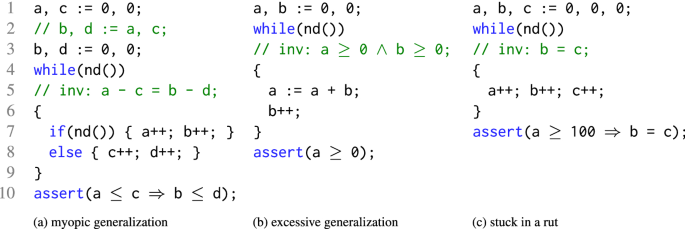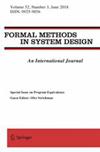Global guidance for local generalization in model checking
IF 0.8
4区 计算机科学
Q3 COMPUTER SCIENCE, THEORY & METHODS
引用次数: 0
Abstract
Abstract SMT -based model checkers, especially IC3 -style ones, are currently the most effective techniques for verification of infinite state systems. They infer global inductive invariants via local reasoning about a single step of the transition relation of a system, while employing SMT -based procedures, such as interpolation, to mitigate the limitations of local reasoning and allow for better generalization. Unfortunately, these mitigations intertwine model checking with heuristics of the underlying SMT -solver, negatively affecting stability of model checking. In this paper, we propose to tackle the limitations of locality in a systematic manner. We introduce explicit global guidance into the local reasoning performed by IC3 -style algorithms. To this end, we extend the SMT - IC3 paradigm with three novel rules, designed to mitigate fundamental sources of failure that stem from locality. We instantiate these rules for Linear Integer Arithmetic and Linear Rational Aritmetic and implement them on top of Spacer solver in Z3. Our empirical results show that GSpacer , Spacer extended with global guidance, is significantly more effective than both Spacer and sole global reasoning, and, furthermore, is insensitive to interpolation.

模型检验中局部泛化的全局指导
基于SMT的模型检查器,尤其是IC3类型的模型检查器,是目前验证无限状态系统最有效的技术。他们通过对系统转换关系的单个步骤的局部推理来推断全局归纳不变量,同时采用基于SMT的过程,例如插值,以减轻局部推理的局限性并允许更好的泛化。不幸的是,这些缓解将模型检查与底层SMT求解器的启发式方法纠缠在一起,对模型检查的稳定性产生了负面影响。在本文中,我们建议以系统的方式解决局部性的局限性。我们将明确的全局指导引入到由IC3风格算法执行的局部推理中。为此,我们用三个新规则扩展了SMT - IC3范式,旨在减轻源于局域性的基本故障来源。我们实例化了线性整数算法和线性有理算法的这些规则,并在Z3中的Spacer求解器上实现了这些规则。我们的实证结果表明,GSpacer,即在全局指导下扩展的Spacer,比Spacer和单独的全局推理都有效得多,而且对插值不敏感。
本文章由计算机程序翻译,如有差异,请以英文原文为准。
求助全文
约1分钟内获得全文
求助全文
来源期刊

Formal Methods in System Design
工程技术-计算机:理论方法
CiteScore
2.00
自引率
12.50%
发文量
16
审稿时长
>12 weeks
期刊介绍:
The focus of this journal is on formal methods for designing, implementing, and validating the correctness of hardware (VLSI) and software systems. The stimulus for starting a journal with this goal came from both academia and industry. In both areas, interest in the use of formal methods has increased rapidly during the past few years. The enormous cost and time required to validate new designs has led to the realization that more powerful techniques must be developed. A number of techniques and tools are currently being devised for improving the reliability, and robustness of complex hardware and software systems. While the boundary between the (sub)components of a system that are cast in hardware, firmware, or software continues to blur, the relevant design disciplines and formal methods are maturing rapidly. Consequently, an important (and useful) collection of commonly applicable formal methods are expected to emerge that will strongly influence future design environments and design methods.
 求助内容:
求助内容: 应助结果提醒方式:
应助结果提醒方式:


